-
Rendez-Vous with French Cinema 2023
Last edited by Chris Knipp; 01-26-2024 at 07:10 PM.
-
THE NIGHT OF THE 12TH/LA NUIT DU 12 (Dominick (Moll 2022)
DOMINIK MOLL: THE NIGHT OF THE 12TH/LA NUIT DU 12 (2022)
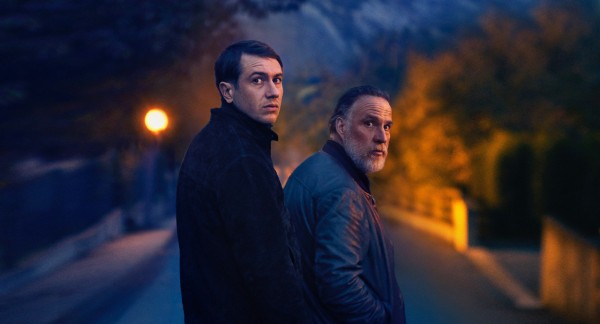
BASTIEN BOULON, BOULI LANDERS IN LA NUIT DU 12
". . . ce sont tous les hommes qui ont tué Clara" (All men killed Clara)
In his Cannes review Jordan Mintzer of The Hollywood Reporter describes this new film from Dominik Moll, which just won the 2023 César award, France's Oscar, for Best Picture as "a brooding, serpentine investigative drama that brings to mind movies like Zodiac and Memories of Murder, though on a more intimate scale"; [it] follows two hardened French detectives trying to solve a gruesome murder that constantly eludes their clutches." On-screen titles lay it out at the start, telling us: "French police open 800 murder cases a year. 20% remain unsolved. This is one of those investigations."
Conveying to us this maddening frustration of intensively pursuing for months, even years, a case that cannot ultimately be solved, Moll delivers a smoothly crafted, seamlessly edited film that is haunting and strangely pleasurable, a film that dramatizes the torment and dedication of the investigating officers at work. The unobtrusive look of this well-oiled film contrasts, perhaps, with its dramatic physical setting. The original case this adaptation is based on has been transferred from the Paris region to near Grenoble, in the French Alps, providing vast, austere vistas suggesting an epic task and the solitude of the "PJ" (Police Judiciare) investigators whose obsessive task yields no fruit.
Contrastingly at the start, there is jollity and esprit de corps as, in a pleasant and informal gathering, we meet first the investigative team of the French Police Judiciaire. Touranchau (Nicolas Jouhet), the old "chef du groupe," retires and passes the torch on to Le capitaine Yohan Vivès (Bastien Boulon). The younger, almost boyish Vivès will lead the investigation that is the focus of the film, the inquest into the death of a 21-year-old woman. The methods are contemporary. This is a world of malfunctioning software, of Facebook meetings and omnipresent smartphones. The PJ staff tap many phones and use remote cameras. But the work is earth-bound, and there's a freak-out early on when a copy machine jams and can't be fixed by the officer.
After we meet the police we meet the victim and the crime and the growing list of men somehow involved with her who might be the murderers and for a while are suspects. She is Clara Royer (Lula Cotton-Frapier), whom we see murdered, suddenly set fire to with gasoline and a lighter walking home through a park after a party. She is young, happy, in a great mood. Her last words are a joyous declaration of eternal love to her best girlfriend. And then the torching, sudden, out of the dark, strangely, in a horrible way, almost beautiful. Clara becomes a human flame, running off into the darkness of the summer evening.
The investigation leads to a bewildering succession of men who have flowed in and out of the "uncompmlicated" Clara's life. There is Wesley Fontana (Baptiste Perais), her current boyfriend. There is Jules Leroy (Jules Porier), her longhaired, youthful "sex friend." There is Denis Douet (Benjamin Blanchy), a marginal jobless type she had sex with; her bgf, Stéphanie Béguin, "Nanie" ( Pauline Serieys) was ashamed to mention him, and this covering up makes her seem suspicious. Nanie, the best source on Clara's men, isn't very forthcoming.
There is Vincent Caron (Pierre Lottin), arrested for assault of a woman, who turns out to have been - he does not deny it - another temporary sex partner of Clara who turns up by leaving a bloody T shirt at the "shrine" for her. His girlfriend Nathalie Bardot (Camille Rutherford) covers for him. Gabi Lacazette (Nathanaël Beausivoir) is the rangy, bearded black rapper who wrote the rap threatening to torch Clara. Mats (David Murgia) is the wide-eyed mystery man who turns up on the third anniversary of Clara's death.
The viewer's constant companions of course are a pair, good cop-bad cop if you will, who head the investigation of the girls' murder. Marceau (Bouli Lanners) is the problem partner, unrestrained and stressed by a disintegrating marriage. The younger, solemn investigator is the group leader, Yohan Vivès. Periodic interludes where Yohan rides a bike around a vélodrome at night underline his loner, determined aspect. He also fit, cool. But dangerously obsessive, perhaps. He will have to switch to the open road.
The beauty of this superficially detailed, basically simple film is in two things. First, that this is an unresolved case: it shows how tormenting that is to the cops - and to Judge Beltrame (Anouk Grinberg) the examining magistrate (juge d'instruction), a woman, who emerges as a newly involved party later in the story. Thus we are invited over and over to ponder the crime and the victim. Secondly, this exploration brings out (a little over-explicitly, perhaps; but can it be anything but explicit?) the ways in which violence and gender are intertwined. Thus Yohan arrives at the conclusion that any man connected with Clara could have killed her, indeed any man could have killed her. This he delivers in a little speech to Judge Beltrame when she first summons him back to work with her on the case again: any one of the male suspects could have killed this beautiful, helpless young woman. In a sense they all did it, because any of them could have: "ce sont tous les hommes qui ont tué Clara" -"It's all men who killed Clara." "L'enfer, c'est les hommes," as one critic has quipped."C'est quelque chose qui clache entre les hommes et les femmes," "there's something wrong between men and women."
And so like Woman Talking or She Said this becomes absolutely timely. This is another current cinematic contribution to the gender wars, a #MeToo film, and a good one. We see why Moll and his co-writer chose this case to adapt from the 500-page volume by Pauline Guéna, 18.3 – une année à la PJ/18.3 - a Year at the PJ. This is fertile material. Compared to the fanatical work of David Fincher, La Nuit du 12 may pale a bit for some viewers. But this is different; by intention partly a thriller but also very much a meditation, an action film that makes you think. In Moll's oeuvre, it ranks up at the top with With a Friend Like Harry (2000) and Lemming (2005), and at his best, Moll is memorable indeed. A masterful film, not to be missed.
La Nuit du 12/The Night of the 12th, 115 mins., debuted in competition at Cannes May 20, 2022. A Film Movement release (France) July 13, 2022; AlloCiné press rating 4.4 (88%). Screened for this review as part of the FLC-UniFrance Rendez-Vous with French Cinema:
Tuesday, March 7 at 3:30pm
Friday, March 10 at 6:15pm (Q&A with Dominik Moll)
Last edited by Chris Knipp; 04-02-2023 at 05:44 AM.
-
THE WORST ONES/LES PIRES (Lise Akoka, Romane Gueret 2022)
LISE AKOKA, ROMANE GUERET: THE WORST ONES/LES PIRES (2022)
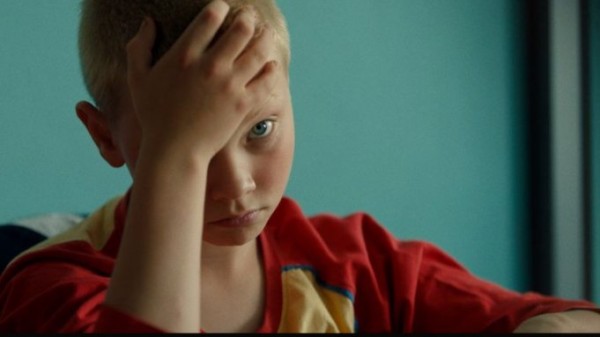
TIMÉO MAHAUT IN THE WORST ONES
Joys and dangers of street casting
This film-within-a-film seeks to explore multiple aspects of shooting movies with underage non-actors - the beauties and charms but also the pitfalls and moral hazards of such work. The teenagers handsomely lensed by dp Éric Dumont - gorgeous light enhancing the beauty of fresh faces - are especially powerless because they come from poverty, being mostly residents of the "Picasso" housing project in the northern costal town of Boulogne-sur-mer. Local residents of the area object to the casting. Why don't the filmmakers pick more flattering representatives of their town? they ask. Why choose instead "les pires," the worst ones, the misfits, the disciplinary problems? Well, there is a reason, because Gabriel (Johan Heldenbergh, star of The Broken Circle Breakdown ), the Belgian-born director, on his first feature as such though 57, having long been a casting director who dealt with young non-actors - wants to tell a story about a hard luck family, and he finds them to play versions of themselves.
Fair enough. But the resuilts can be challenging for the audience too. The kids filmed here are unkempt, unruly, and spout torrents of the foulest language in today's French maudit lexicon. But more than that they seem to be lured into violence and sex, unsafe situations as risky as anything Larry Clark would have indulged in, and with a less clear point of view than his. Gabriel befriends and acts chummy with the kids. Maybe at first his ease with them is appealing. But over time it emerges as creepy. And some of them don't buy it. One small girl, Maylis (Mélina Vanderplancke) resigns from the production midway though Gabriel begs her not to and insists she's integral to it despite having no further lines of dialogue. At other times Gabriel is shown to be overstepping the boundary into the kid's private lives.
The Worst Ones winds up being one of the most uncomfortable watches in any Rendez-Vous with French Cinema (as part of which it was screened for this review). On the other hand, the teenagers chosen as the main performers are cute and full of life and can be charming. But it's a little surprising that critics were not more bothered by the fictional director's missteps and have greeted this film since its debut at Un Certain Regard with unmixed enthusiasm.
Ryan (Timéo Mahaut) is a key figure. At first he is inarticulate, but Gabriel wants him: he has a mother (alcoholic?) who's been barred from him with a restraining order, and a close relationship with a sister. Later, it's impressive to see how the responsibility of being given a central role in the film with hundreds of pigeons released behind him in a climax, Ryan behaves in a surprisingly mature and nuanced way. Also important is Lily (Mallory Wanecque) who - in the story but also in real life? the line isn't clear - has gained a reputation as a "whore" in school and admits more than once to having given blowjobs to two boys in the restroom. Now she - the character, not the girls - is pregnant. Lily, who has star quality and a winning smile (as does Ryan) is wanted by Gabriel for to co-play in story of first love with Jessy (Loïc Pech) a 17-year-old boy who is (again the line between fact and fiction fuzzy) just back after a jail sentence for hit-and-run driving.
The time when Gabriel screams at kids and incites a schoolyard battle that does on dangerously long is concerning. But it's the sex scene he directs between Lily and Jessy - with no intimacy coordinators - that achieves maximum audience unease. In The Cinema Show Alessandro De Simone suggests although Les Pires teeters between "patheticism and exploitation" "the latter" "is openly declared and effectively neutralized." He holds that the film was "shot with great dryness" and "edited with wisdom and rhythm." Is he saying its bad taste is in good taste? I've been a fan of Larry Clark, and know the noted cinematographer Ed Lachman shot with conviction the banned-in-the-USA Ken Park. Akoka and Gueret's vision of life-on-the-run and kids being manipulated is certainly intense here. (It grows from a happy experience like Gabriel's in their film, wrangling street-cast actors and making a short film with who they found. After watching, the messiness and boundary-crossing of Les Pires linger in the mind's eye. But one remembers Rod Paradot in La Tête haute in 2016, the strong performance Emmanuelle Bercot helped him to achieve and his joy at receiving the Meilleur Espoir Masculin award. Seeking out rough young talents still seems worthwhile, despite the pitfalls. (For more perspective see the review by Anna Smith in Deadline.)
The Worst Ones/Les Pires, 99 mins., debuted in Un Certain Regard at Cannes May 22, 2022 and played at Angoulême, Toronto, Hamburg, and Namur. A Kino Lorber release Mar. 24, 2023 Quad Cinema (NYC). Dec. 7, 2022 French release; AlloCiné press rating 3.9 (78%). Rendez-Vous with French Cinema, Lincoln Center:
Sunday, March 5 at 12:30pm (Q&A with Lise Akoka and Matthias Jacquin)
Tuesday, March 7 at 1:00pm
Last edited by Chris Knipp; 03-23-2023 at 01:40 PM.
-
THE GREEN PERFUME/LE PARFUM VERT (Nicholas Pariser 2022)
NICOLAS PARISER: THE GREEN PERFUME/LE PARFUM VERT(2022)
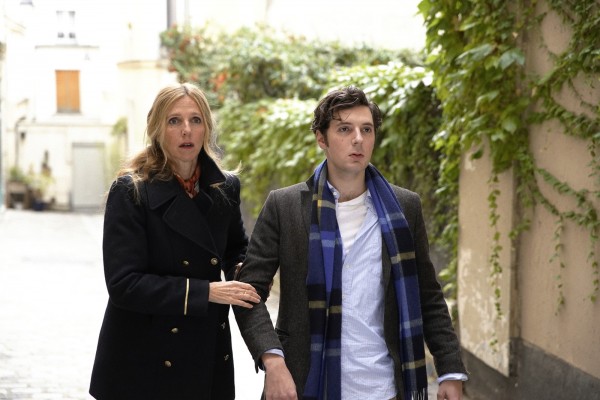
SANDREINE KIBERLAIN, VINCENT LACOSTE IN LE PARFUM VERT
Nicolas Pariser’s "whimsical comedy adventure" underwhelms
When an actor dies onstage during a performance at the Comédie-Française, his final words to fellow actor Martin (Vincent Lacoste) are to say he’s been murdered, followed by the mysterious phrase "green perfume." This leads to Martin's being on the run partly from the cops, partly from bad guys, and partly in search of what "green perfume" means and how to expose the wrongdoers who go by this name. When Martin remarks ater that he's only a mediocre actor, that part is believable, but it's far-fetched to claim the goofy Lacoste as a member of the French national theater. Martin winds up in the posh home of an unknown big shot with a collection of cartoon drawings that night. When he emerges the next morning, staggering and confused, he goes to a bookstore trying to find out who this collector was. This is only the beginning of a string of inexplicable plot details that will make up the rest of the action.
After the political theorizing of The Great Game and the dive into local politics in Alice and the Mayor, Pariser apparently wanted to try something more on the light side, a sort of comedy-romance-noir. The travels and travails of Martin and Claire Cahan, the quirky comic book artist played by Sandrine Kibrerlain, who impulsively (and inexplicably) joins him on a busy train journey to Brussels, then Budapest, are all watchable enough. The two actors work well off each other. It's fun just seeing Lacoste rustle up p a pot of pasta.
But the action never acquites much mystery, excitement, or less still romance. The comedy is only very occasional. The writing is patchy. There's a sudden thread out of nowhere about being Ashkenazi Jews and her living 20 years in Israel that just doesn't fit in at all. One cannot blame Nicolas Pariser for opting for purer entertainment in the form of a spy comedy, and it makes sencd that he's evoking the thriving Fake News industry and growing anti-Semitism in Europe, subjects that could not be more serious, a priori. But this contradiction is not the main reason for the near-failure of this film. It's mainly that the plot has the twin faults of neither being exciting nor making much sense.
It is obvious from the start that Pariser has Hitchcock and his North by Northwest in mind, but it's dangerous to invite comparison of an effort as haphazard as this one with a masterpiece from one of film's most letter-perfect, high intensity mystery-action storytellers. This not only is not genius filmmaking. There are real continuity problems here, inexplicable costume changes, and a climax that makes very little sense.
This is one of those cases where a bad effort by a filmmaker makes one wonder if one had overvalued his earlier works. The talk about political manipulation by an ultra-right group and distributing software designed for the rapid spread of misinformation is certainly timely. And the fact that the treatment of it is superficial perhaps doesn't matter: the bad guys in North by Northwest are pretty simple bad guys; it doesn't have to be too specific. But in an action movie the demands are rigorous, the plot details have to work. And these don't, particularly.
Every so often somebody gets killed, though we don't see them. Claire gets shot in the leg (so we're told) and Kiberlain is seen intermittently limping, on crutches, or using a cane. When they get to Budapest Martin is scheduled to be in a Comédie Française production of a classic play in French rhymed couplets, the actors in ill-matched modern clothes. Somehow they come up with the notion that one of the actors who will on stage that night is an agent of the evil "green perfume" group andnd that he or she will signal someone in the audience about the location of a secret material (the "McGuffin" called 'Anthracite") by departing from the written text of the play. One didn't qite see how that works. It seems preposterous, but maybe Hitchcock could have carried it off. And he would certainly have made it ten times more exciting. Because of the colorful backgrounds, the busy action, the charm of the performers, and playing a lot of this - not all! - as "whimsical" comedy, we make allowances. But the final effect is just okay.
See Jonathann Romney's Screen Daily review for a more detailed explanation of how and why this movie doesn't work.
Le Parfum vert/The Green Perfume, 101 mins., debuted at Cannes Directors Fortnight May 26, 2022. Released in France in Oct., in numerous other countries since. AlloCiné press rating 3.5 (70%). Screened for this review as part of theRendez-Vous with French Cinema (Mar. 2-12, 2022).
R-V showtimes:
Wednesday, March 8 at 6:15pm (Q&A with Nicolas Pariser)
Saturday, March 11 at 1:00pm
Last edited by Chris Knipp; 03-04-2023 at 12:50 AM.
-
DIARY OF A FLEETING AFFAIR/CHRONIQUE D'UNE AFFAIRE PASSAGÈRE (Emmanuel Mouret 2022)
EMMANUEL MOURET: DIARY OF A FLEETING AFFAIR/CHRONIQUE D'UNE LIAISON PASSAGÈRE (2022)
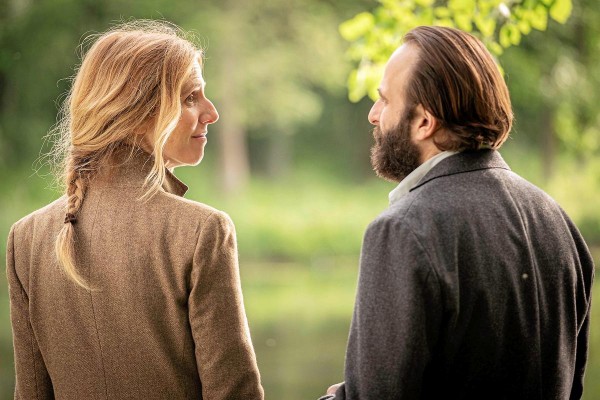
VINCENT MACAIGNE, SANDRINE KIBERLAIN IN DIARY OF A FLEETING AFFAIR
The feeling in this affair doesn't come till it's over
The title tells you what we're in for, no more, no less. A series of time-lines calibrates the affair's progression, end, and aftermath (possibly the best part), just like in an Éric Rohmer film. And as in Rohmer, the couple does nothing but talk about love affairs without ever making love on screen. The other element Mouret's identified with, the Woody Allen, is supplied by Simon (Vincent Macaigne), the shy, self-deprecating lover with a touch of French finesse and a physicality provided by his occupation: OB/Gyn prenatal trainer. But the sweetly goofy Macaigne has none of Woody Allen's intelligence and wit. (There is comedy, some of doubtless lost on the Anglophone viewer.)
In Rohmer, the people are young and attractive. Short, dark, bearded, stocky Simon and tall, blond, angular Charlotte (Sandrine Kiberlain) make an odd and no particularly sexy of attractive couple. Their "chemistry" seems more just acting skill, of which they have plenty. The writing, in French fashion, involves a lot of talk about love, but the drama of indecision and expectation in Rohmer or the excitement of plot twists in French farce are almost entirely lacking. Instead, this winds up being an attractively played discussion of the ins and out of a fleeting, or not-too-deep, love affair. Can it be pleasure without pain? (Of course not.)
The pair aren't much to look at but are nicely dressed, Kiberlain tweedy, Macaigne in a succession of impeccable suit jackets, and they discuss their affair's pros and cons and progression and limits in impeccably well-turned sentences. Simon is hesitant, then eager. Most of the conversations are about hat, and Charlotte's keeping him from wanting too much or getting clingy, and they get repetitious so fast the movie starts to pall before reaching the halfway mark.
Rohmer found more beautiful people and knew well how to play with temptation and expectation in ways Mouret hasn't a clue about. This film, like Rohmer's, is quite artificial, a minuet (this was carried to an extreme in Mouret's 2020 The Things We Say, The Things We Do). To see just how artificial it is, what the passion and cost of a real extramarital affair can be, compare Mia Hansen-Love's wrenching One Fine Day (note also how much sexier and better looking the stars, Léa Seydoux and Melvil Poupaud are; how much more a sense of their characters' surrounding lives we get).
This in contrast is an elegant, stylish, rather bloodless exercise with its Serge Gainsbourg songs and its sweet little intervals of Mozart piano, its lovely forests and parks and handsome interiors. Meant as a civilized entertainment, it unfortunately only entertains for a while. Apparently aware of the way it's started to get draggy and repetitious before midway, Mouret jazzes things up with a surprise out of the modern playbook: a third party met via a dating app, Louise (Georgia Scalliet). She's got kids and an architect husband, justifying the palatially minimal modern house she lives in, where after a meeting at a museum, the amorous encounter (unseen) takes place. And she shakes things up in a way the resolutely hetero Rohmer never thought of.
That third party destroys the couple, and the modest, wimpy, fatalistic Simon accepts that this was a fleeting affair anyway. But it is when he and Charlotte meet again by chance outside a cinema two years later, see a film together (ironically that most robust of couples dramas, Bergman's Scenes from a Marriage), then have a walk-and-talk after, that the film finally achieves some real emotional resonance. What's best is that both Simon and Charlotte have fond memories of their affair, both wish they could resume it, and go further, both sadly must accept that they can't. Looking nostalgically back on a love affair has rarely been handled so poignantly in a film. Too bad some of that emotion couldn't have come earlier.
Diary of a Fleeting Affair/Chronique d’une liaison passagère, 100 mins., French release Jan.. 24, 2022; AlloCiné press rating 4.0 (80%).
Friday, March 3 at 4:00pm
Monday, March 6 at 9:30p
Last edited by Chris Knipp; 03-01-2023 at 12:49 AM.
-
FOREVER YOUNG/LES AMANDIERS (Valeria Bruni Tedeschi 2022)
VALERIA BRUNI TEDESCHI: FOREVER YOUNG/LES AMANDIERS (2022)

Lightning in a bottle: recreating a famous French acting school of the eighties
Forever Young recreates the youthfulness, the energy, and the risk of famous director-impressario Patrice Chéreau's regime in the 1980's at the Nanterre theatrical school of Les Amandiers. The young actors are beautiful and exciting. The action flows. In the director's version Chereau, played by Louis Garrel (with whom she was in a relationship from 2007 to 2012) is imperious and passionate. There is also another director, equally important, though two attractive young actors who are star-crossed lovers steal the show. Despite its slightly over two-hour run time, this is a vibrant ensemble piece that was presented in Competition at Cannes. Bruni Tedeschi, who collaborated on the writing with Caroline Deruas-Garrel and directdor Noémie Lvovsky , knows whereof she speaks. She was actine at the "dream space" avant-garde school at the time depicted along with, among others, Eva Ionesco, Agnès Jaoui, Vincent Perez and Bruno Todeschini.
There isn't much plot, more just stuff that happens. First there is the competition of a flurry of attractive and vibrant young people who perform or act crazy for the management seeking entry. It's their attractiveness and vibrancy that are this film's chief selling points; that the script and the direction don't get in their way. Forty chosen ones emerge, who will be narrowed down to twelve. A memorable sequence is simply the time when the young hopefuls crowd around the list of those selected, and the various exaggerated reactions when they learn they have or haven't been. One young women is so disappointed not to be, she winds up staying around as a waitress in an on-site restaurant. Some of the girls are pretty crazy, bragging that they're wearing no underpants, and lifting skirts to show their bare asses and farting.
Later, there will be drugs. The director is introduced to heroin by the most dynamic and dangerous student, Étienne (Sofiane Bennacer). Chereau is partial to coke. A girl who is pregnant turns out when she is in hospital to have her baby to have AIDS. Since her young husband, also an actor-student, has had sex with many who have had sex with everybody else, there is panic. This subsides, however.
The film has the temerity to give Etienne a girlfriend called Stella (blonde, bee-sting lippped Nadia Tereszkiewicz) and suggest not entirely humorously that he might be compared to Brando. Bennacer indeed generates energy and dangerousness in spades (he has since become controversial and #MeToo-type accusations have caused him to be scheduled for judicial action*). But Étienne's problem is that he turns out not just to be playing with heroin but a full-on addict who confesses to Stella that he has black moods, that he's a psycho, and she better stay away. Too late, of course. There is much drama in the private lives for the actors to focus fully on the on-stage kind.
The feature of Les Amandiers at this time is that the "students" immediately become a "company" and time is not wasted on the usual exercises: instead both directors immediately begin rehearsals for play productions. (Later they will have the opportunity to join Lee Strasberg at the Actors Studio n New York, though.) Chereau, which really happened, decides because the actors are all so young themselves to stage a play Chekhov wrote when he was only eighteen. But we don't see much of this. What we do see is an lengthy tantrum Cheraau stages to complain of what he deems poor staging of an elaborate physical sequence involving restaurant tables moved together. It seems utterly pointless, indeed itself an acting exercise.
It's too hard, or too boring, to show a theater/acting school at work (just as it's too hard to show painters painting or writers writing or scientists discovering, or anybody doing work) and this, together with the energy of the specific actors, no doubt, that much of the excitement and focus of Foreever Young goes to the love of Étienne and Stella and the downward spiral of Étienne's too-exciting life. But while there are limitatiions here, the sweet English-language title is right to point the the chief feature, the youth, attractiveness and vibrancy of a group like this - as well as the inappropriate and dangerous behavior.
Some English-language critics hate this film. Peter Bradshaw of the Guardian finds its "perpetual pouting and nonstop narcissism" to be "epically tiresome," Jessica Kiange of Variety finds it "indulgent," and Metacritic comes up with a mmiserable rating of 44%. The French critics (and French public reflected on AlloCiné) on the contrary were charmed by the sheer life and energy of this film and the AlloCiné press rating is 4.0 (80%). I side with them. Les Amandiers captures lightening in a bottle. However some moments may fail or go over the top, the dynamism and energy of a young theatrical troupe are captured here. It's worth it for its best moments, because they're fun and exciting. Bruni Tedeschi, as Le Monde's critic puts it, "pays tribute to the magic of acting, to the mystery of the dramatic art." It is that je-ne-sais-quoi she captures that can't be condensed into a "Fame"-style collection of techniques, thumbnail bios, or storylines.
Forever Young/Les Amandiers, 126 mins.,debuted in Competition at Cannes May 22, 2022, showing at Munich, La Rochelle, 'Angoulême, and at least 18 more festivals. AlloCiné; Metacritic.
Sunday, March 5 at 9:30pm
Friday, March 10 at 1:00pm
___________________________
*In defense of the young actor, 136 well known colleagues signed a statement urging that he not be penalized without trial. "Rape is a crime," it says, and because it is a crime, a court of law must decide if someone is guilty of it.
Last edited by Chris Knipp; 03-04-2023 at 03:55 PM.
-
FOR MY COUNTRY/POUR LA FRANCE (Raschid Hami 2022)to
RASCHID HAMI: FOR MY COUNTRY/POUR LA FRANCE (2022)
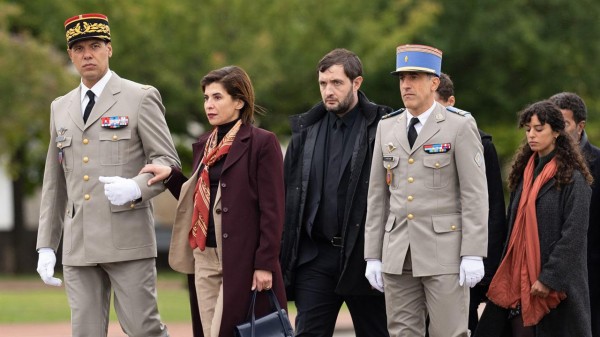
An intensely personal film about the tragic death of a promising brother
In the irnoically titled Pour la France Ismaël (Karim Leklou of The World Is Yours)) confronts, a decade later, a terrible family event in this bitter and intense autobiographical film. It is the death of Jallal/Aissa (Shaïn Boumedine, of Mektoub, My Love), the filmmaker's handsome, promising younger brother in a hazing ritual at Saint Cyr, France's elite military academy. The film is complexly structured to begin with this event, then shift back and forth to other moments. It first shifts to a conflicted early childhood in Algeria, when the mother took the two boys to France and left their soldier father behind. Then it begins to unreel the family's present-time conflict with the authorities over the ceremony and burial. And intermittently it flashes back to more recent moments when Jallal was in Taipei, Taiwan's capital and Ismaël came to visit him.
The hazing tagedy is intensely forward, dizzying, and shocking, a great onrush of closeups of a crowd of young men being herded into a near-frozen pond brightly head-lit, then cast into sudden darkness. The childhood recollections are quiet and remote, with a nostalgic period flavor, till there is a scary confrontation of the little boy who holds out against the father's insistence that he reveal where their passports are hidden. In Taipei, everyone has to speak English, with the effect that feelings and ideas come out simpler and cruder.
These time-shifts all underline the centrality, and a growing sense of the injustice, of the tragic death of the brother,and show how it is overcast with wrenching early family conflict and the sharp differences between the two brothers, the younger one handsome, promising, and motivated, the older listless and unfocused. A powerful, brooding, but rather confusing mood emerges by the way events are intense, yet treated as at one remove. This is what Amber Wilkinson is referring to when she writes in her Screen Daily Venice Orizzonti review that "the tenor of the film tends toward the dour." The bitter intensity of feeling in sequences across time periods causes the film to curdle somewhat, its message lost in implosion.
The effect is of a meditation on the complex feelings among divided families compounded by the bitter feelings engendered by the injustices of colonialism. This is a powerful film, whose intensely personal familial subject matter one feels. But one wishes the structure had been clearer and more forceful. Hami had to wait until the emotion had stilled: it is important to him, and stated in the script, to avoid name calling and crude anger. If everyone is guilty, no one is guilty. But loyalties will always be divided. The supreme irony is that Jallal was the best, a brilliant and outstanding student at the elite "grande école" Sciences-Po, greeted as an exceptionally promising cadet. But why die for France, the colonial power against which the Algerians fought a long and bitter war of independence? And how much more ironic still to die not in a brave military action but in a confused and morally dubious ritual, excused by giving it a special name, "bahutage." (Some authorities were eventually tried, but given trivial sentences.)
Certain moments stand out: the horrible helplessness of the hazing, being forced at night to enter a near-frozen pond. In Algeria, the boys' harsh father trying to force the younger boy to tell him where their passports have been hidden. The boy is defenseless and fearful, yet does not yield - nor does the father resort to physical brutality; he gives up. The mother wants to move to France, the little boys don't (except the younger says the candy's better there), yet they resist the will of their father, who later is estranged, and reappears only years later, limping, but otherwise unchanged, when he's gotten wind of the death of Jallal and wants to be involved.
The powerful performance of the acdtress Lubna Azabal (of Incendies) as Nadia, the mother, flows through various sequences. Memorable indeed is her wailing and yelling in traditional Arab style when the corpse of Jallal - resplendent and erect in military dress uniform - is laid out for the family to view it, while stiff French military authorities stand by. The contrast between their French colonial uniformed look and Nadia's impulsive, unbridled shreiks says it all.
And of course there is language, which more than anything underlines the built-in ambivalence of being born maghrebi, a citizen of the western corner of North Africa with an overlay of colonial legacies. The family members constantly shift between French and Arabic when they speak. And when the brothers are uprooted from the Francophone environment in the Far East and must communicate in English, that is like shining a distorting light on them. Hami may have produced a somewhat indigestible film, but its fairness and authenticity can't be questioned.
For My Coiuntry/Pour la France, 113, cowritten with Olivier Pourriol, shot by Jerome Almeras, edited by Joelle Hache, debuted Sept. 2022 in the Orizzonti section at VEnice; the flimmaker's previous feature La Melodie also debuted at Venice out of competition in 2017. Released in France Feb. 8, 2023, it received an AlloCiné press rating of 3.9 (78%). Screened for this review as part of the Rendez-Vous with French Cinema, March 2–12, 2023 (NYC).
Thursday, March 9 at 6:30pm (Q&A with Rachid Hami)
Friday, March 10 at 3:45pm
Last edited by Chris Knipp; 03-03-2023 at 11:37 PM.
-
WINTER BOY/LE LYCÉEN (Christophe Honoré 2022)
CHRISTOPHE HONORÉ: WINTER BOY/LE LYCÉEN (2022)
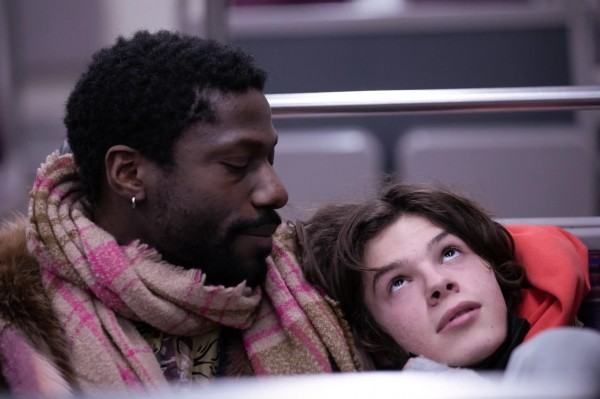
ERWAN KEPOA FALE, PAUL KIRCHER IN WINTER BOY
Honoré's younger self confronts destabilizing influences
Most of Christophe Honoré's films are only slightly autobiographical. This one is very much so. The young protagonist, Lukas Ronis (Paul Kircher), sometimes wears the kind of checked jackets that are the director's trademark, and Honoré himself plays the boy's (his own) father. The father dies early on in a car accident, running head-on into a truck, coincidentally shortly after a ride with his son in which they were run off the road. The rest of the film will be about the young openly gay, but emotionally unstable, Lukas' effort to cope with this shocking event and perhaps his own self-doubts. The film confronts these difficult early events in the filmmaker's life.
Honoré's Sorry Angel/Plaire, aimer, et courir vite (NYFF 2018) was also, even more fulsomely, autobiographical. It dealt with what the filmmaker called "les jours sinistres et terrifiants" - the grim and terrifying days - of the Eighties and Nineties, the days of AIDS, when Honoré first came from Rennes and made his career in Paris.Winter Boy is a less full portrait and a less successful film, but it is not without complexity and doubtless deserves a place as a portrait of early development and early struggle.
Most of all it merits our attention for the beauty and graceful touch of the young find, Paul Kircher, in the lead. Rarely have instability and anguish been made to feel so lighthearted. The supporting players are also fine. Juliette Binoche as usual is emotionally strong and appealing as Lukas' mother and Vincent Lacoste, who was the lead in Sorry, Angel, feels fresh as Lukas' older brother, Quentin - and looks fresh too, with a different wardrobe and bleach-brushed hair, although the theme of sibling conflict isn't as fully developed as in Honoré's Dans Paris (R-V 2007).
Honoré isn't, by a long sight, embodying as many roles and selves here as in Sorry, Angel, but Lukas does some turnabouts. After he's been fetched from boarding school and only gradually told that his father, who's "in the hospital," is dead, and he's tucked into bed, he has a screaming fit that leads to his being injected with a strong sedative. Later he's very sweet with his aggrieved mother. When Quentin takes him to his apartment in Paris for a fortnight, he stops along the way to play eager bottom one last time with his boyfriend Oscar (Adrien Casse)- a bit of explicit gay sex for the viewer and proof that Lukas has been there, done that.
He's inappropriate, goofy, forward, and giddily risk-taking at Quentin's place, and isn't much chastened by his older brother's admonitions that it's his place, his work as an artist, to stay out till six p.m., and not to bother his roommate Lilio (Erwan Kepoa Falé). But Lilio is tall, black, and tricks with older men, and Lukas sees a romance here and not only that, wants a piece of Lilio's action. While Lukas is out in Paris on his own, the film cuts back and forth between him talking to a priest in a church about the Resurrection and him having sex with a young guy he met on the street - in the same, he thought, great day.
It seems obvious that Lukas can get into a lot of trouble and is pretty weak in the impulse control department. Later, when Quentin sends him back to the provinces and his mother takes him to Chambéry for boarding school again, he does what too many teenage boys do, and winds up in a long recovery period. Some of this action seems very random as Honoré seeks to capture the instability of his young self, and then some. A frequent voiceover by Lukas and a brief one by his mother seem aimed to provide some kind of stability. Despite an interesting silent-protagonist section and a sweet romantic exchange with Lilio, however, the film's last quarter loses energy and direction. But Lukas as incarnated by Kircher, is a runner, illustrating literally the third item in Sorry, Angel - to please, love, and run fast. In ignoring the creative side of his younger self here, Honoré relegates the film somewhat to the collective category of many emotionally fragile young male coming-of-agers, despite the open gay sexuality. And despite being "out" early, and the enlightened attitudes of his family, Lukas still imagines that his father looked down on him for being gay.
Winter Boy/Le lycéen, 122 mins., debuted Toronto Sept. 9, opening in French theaters Nov. 30, 2022, also showing at a dozen other festivals. AlloCiné press rating 3.7 (74%).
R-V showtimes:
Thursday, March 9 at 3:30pm
Saturday, March 11 at 6:15pm (Q&A with Christophe Honoré)
Last edited by Chris Knipp; 03-07-2023 at 11:47 PM.
-
OTHER PEOPLE'S CHILDREN/LES ENFANTS DES AUTRES (Rebecca Zlotkowski 2022)
REBECCA ZLOTKOWSKI: OTHER PEOPLE'S CHLIDREN/LES ENFANTS DES AUTRES (2022
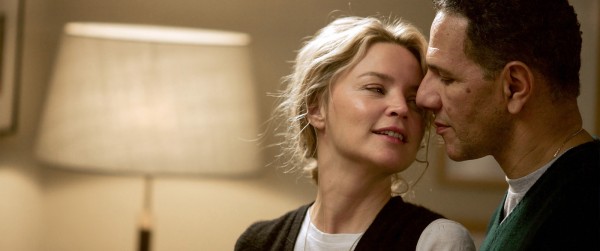
VIRGINIE EFFIRA, ROSCHDY ZEM IN LES ENFANTS DES AUTRES
Divided families
Forty-two-year-old French director Rebecca Zlotkowski (Belle Épine, Grand Central, An Easy Girl) focuses this time on a contemporary issue she had thought underrepresented in films. When a woman getting beyond childbearing age is still childless and single, she may connect with a married man with a young child and that child "of others" may become, by use and by dedication, the closest thing to a child of her own.
So it is with Rachel Friedmann (Virginie Effira) and Leila (Callie Ferreira-Goncalves), the little girl of her boyfriend Ali Ben Attia (Roschdy Zem), whose mother Alice (Chiara Mastroianni) is also in the picture. Ali obviously is of Arab descent. Rachel, like the filmmaker, is an ethnic Jew. This is not dwelt upon or seen as an issue. The real trouble is that Ali's is not a forever commitment to Rachel, as develops after Rachel has given a lot of time and emotional commitment to Leila.
What is Leila's position? Well, Leila is a young girl: she must go with the flow. She warms to Rachel. But she holds her feelings in check for a while; it's complicated. But while this is an engaging and well-acted drama, it may feel somewhat programmatic, and yet, paradoxically, a bit too vague and fluid, never quite hitting upon a decisive scene, its process not helped by loud periodic American-style song interludes.
This film features some of French cinema's most admired and popular stars. According to the standard French film website AlloCiné, this is the best received by both critics and public of Zlotkowskis five features. It may likewise be the most appealing French film of the year for the Anglophone audience - till they see Mia Hansen-Løve's One Fine Morning.
The Children of Others/Les Enfants des autres,104 mins., A Music Box Films release. Sept. 21, 2022 French release; AlloCiné press rating 4.1 (82%) Rendez-Vous with French Cinema (Mar. 2-12, 2022). Showtimes:
Friday, March 3 at 6:15pm (Q&A with Rebecca Zlotowski and Virginie Efira)
Sunday, March 12 at 1:00pm
Last edited by Chris Knipp; 03-04-2023 at 07:46 PM.
-
THREE NIGHTS A WEEK/TROIS NUIS PAR SEMAINE (Florent Gouëlou 2022)
FLORENT GOUËLOU: THREE NIGHTS A WEEK/TROIS NUITS PAR SEMAINE (2022)
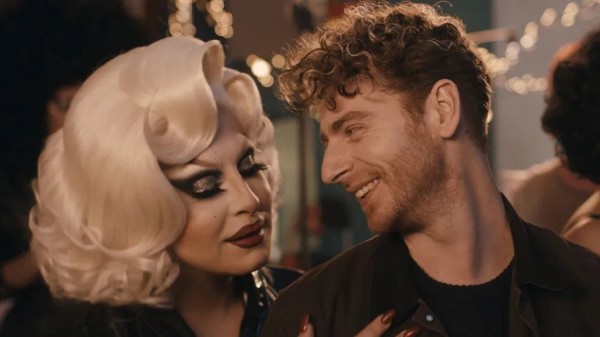
Take a walk on the wild side: a sweet look at French drag queen life
This first French feature film dealing with the world of drag queens is an ambivalent, pleasantly teasing docudrama and romantic comedy centered around Baptiste (Pablo Pauly) the 29-year-old a supervisor at a FNAC store in Paris and aspiring art photographer who becomes fascinated with the world of drag queens in the course of doing a photo story about them. Baptiste is in a relationship with Samia (Hafsia Hedrsi of The Secret of the Grain), who tends to HIV-positive street people. And then he meets "Cookie Kunty"/Quentin (Romain Eck), a young drag queen in Paris, and "something" happens.
Is he in love or just fascinated? He is confused and Samia is not pleased and thinks (correctly) that their relationship is dissolving. The film takes us on a road trip when Baptiste takes time off from work to be the photographer for a group of drag queens who are going to compete for the Drag Olumpus, prize a trip and 20,000 euros. Along the way we meet Bobel (Harald Marlot), Klara Bolt (Mathias Houngnikpo), Iris (Holy Fatma), Javel Habibi (director Florent Gouëlou), and numerous others, including Quentin/Cookie's "Uncle Jean" (Jean-Marie Gouëlou).
There are tender moments and a little sex between Cookie and Baptiste. But Baptiste wants the boy, and the boy wants to be Cookie. There are three people in the ménage, as Baptiste tells in a summing up speech he improvises, inplausibly,l but entertainingly, in front of Cookie Kunty and the audience and judges at the Drag Olympus.
The coda finds Samia and Baptiste amicably separated, a new women in Baptiste's life, and a splendid gallery show of Baptiste's photo story about "drag...les coulisses," the backstage world of drag.
The most interesting part of this sweet, colorful, but overly bland film is its sense of the world of the in-between, and the complexity of definition for people who want "everything to be simple," as Quentin/Cookie says of his liife. The drag queens have approved Baptieste's photographing them out of makeup and preparing for drag, but they don't permit him to shoot them as males. But also as is briefly mentioned in the van traveling to the competition, femmes can drag, bi's can wear drag, "trannies" can wear drag: it's open to everyone. It's a world that's fluid that flows around the heightened, heroic celebration of the feminine that is drag.
While ostensibly doing a photo series, Baptiste has quickly become fascinated and sexually drawn to the gender-mixing world of louche gayness and particularly to Cookie/Quentin. And it turns out Baptiste is as ambiguous as anyone else. Is he gay, straight, questioning? It is hard to tell what's fiction here and whats just acting out - and that is interesting, when we feel the embarrassment of Baptiste. But he drags his feet. He's a tease: but he is out representative, an "ordinary" person who's tempted into the world we're entering.
The film critic of French media journal Les Inrockuptibles concluded about Three Nights a Weeks: "If the film accurately describes the double facet of the life of a drag queen: the colorful and festive scene but also the less glamorous backstage world (homophobia, long make-up sessions), it fails, by dint of being too wise and educational, to recapture through real directorial choices the full subversive force, political audacity and biting humor of the drag world." Yes and this is just enjoyable, deluxe tourism, I guess. And well but the last thing we see is a big question mark. Baptiste may not be done playing. But it's just another easy gesture in this easy, pleasant film.
Three Nights a Week/Trois jours par semaine, 103 mins., debuted in Directors' Week at Venice Aug. 31, 2022, showing also at Namur, Rio, Taipei and Santa Barbara. It was screened for this review as part of the (Mar. 2-12, 2023) Rendez-Vous with French Cinema. Nov. 9, 2022 French release; AlloCiné press rating 3.1 (62%). Screened as part of the Rendez-Vous with French Cinema. Showtimes:
Saturday, March 11 at 3:15pm (Q&A with Florent Gouëlou)
Sunday, March 12 at 6:15pm
Last edited by Chris Knipp; 03-04-2023 at 07:36 PM.
-
MOTHER AND SON/UN PETIT FRERE (Léonor Seraillle 2022)
LÉONOR SERAILLE: MOTHER AND SON/UN PETIT FRÈRE (2022)
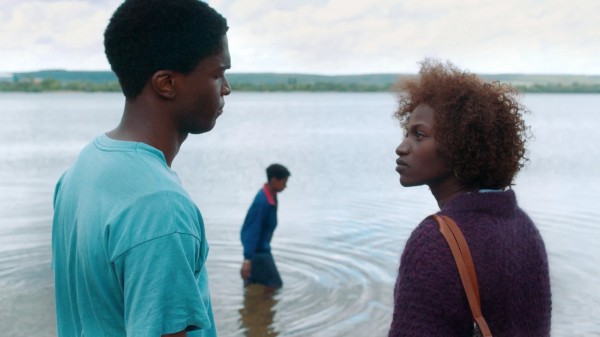
Chaotic tale of Ivoirian mother and her two sons in France is an uneven but someteimes brilliant film, and it nails profound finale
Léanor Serraille's Cannes Caméra d'Or debut Montmarnasse Bienvenue was a film I didn't get, and not from want of trying: I watched and reviewed it carefully twice, in Paris and NYC. But however one may question a white woman signing the decades-long saga of an African mother and her two boys (but Seraiile does have a black family), this surprises and sparkles. It's fresh, it's memorable. Mother and Son/Un petit frère is one of the best French films in recent memory.
Spanning early childhood when they first arrive and stay in the sister's tiny place in Paris and later years when both boys have grown up and changed, it''s divided in three parts: mother, (Rose; the fun-loving, and so much more one) older brother (Jean, the brilliant, doomed one, who crashes and is sent back to Africa), and younger brother (Ernest, who becomes a teacher of philosophy, after discovering Flaubert, bitter, distanced, but standing on his feet).
Frédéric Mercier, Transfuge; "Without ever seeming to want to 'say' an unequivocal message on the issue of emigration, but choosing to make us think about it thanks to the complexity of the links between these three characters (played by formidable actors, notably Annabelle Lengronne), the emotion prevails during a splendid melodramatic finale." Indeed! A marvelous finale.
Fernando Ganzo writes in Cahiers du Cinéma: "The passing of the years introduces a novelistic impulse which, despite a lack of momentum and a sociologising tendency, gives the film an unexpected breadth. Both ambitious and modest, the story maintains the constant tension between unity and uprooting of the trio of protagonists." Therein lies its complexity and its originality.
It's the eithties and the nineties: a son's mention to Rose of Kool and the Gang establishes a moment. Perhaps with a stilll-youthful explicitness, Seraille has Ernest as a student teacher of philosophy in the lycée conduct a discussion about time. What's important is to establish that Rose and her two sones are out of synch and she lives in a desperate post-colonial age. Only one of them has made it, since Jean, the brilliant one, has been sent back to the Ivory Coast when he grew out of control, and he winds up only dreaming of getting a taxi driver's license. Ernest is the only lucky one, and he lvies in a somewhat bitter bubble, in a personal world where he might feel French, were it not for the unwarranted, racist police ID stops.
Jacky Borner, Franceinfo Culure: "The filmmaker does not escape a conventional realism, but also shows flashes of brilliance which, here and there, improve the film."
Léonor Serraille, whose debut feature, despite my non-responsiveness, Montparnasse Bienvenüe, was a critical success in Paris and included in Rendez-Vous 2018, returns with this rather complex, sometimes painful portrait of the relationship between an African immigrant mother and her sons. Upon arriving in France from the Ivory Coast in 1989 with two young children, Rose (Annabelle Lengronne) finds work as a hotel cleaner. The loving and exuberant but erratic mother’s penchant for partying means that she has trouble attending to her job, let alone to her studious sons, Jean (played by Stéphane Bak in adulthood) and Ernest (Ahmed Sylla). Spanning 20 years of their ever-shifting relationship, Serraille demonstrates rare nuance and sensitivity in this thoughtful portrait of an Afro-French family.
Mother and Son/Un petit frère, 117 mins., Feb. 1, 2023 French release; AlloCinee press rating 3.5 (70%). Screened for this review as part of the Rendez-Vous with French Cinema, NYC (Mar. 2-12, 2022) Showtimes:
Monday, March 6 at 6:30pm (Q&A with Léonor Serraille)
Wednesday, March 8 at 1:00pm
Last edited by Chris Knipp; 03-07-2023 at 07:25 PM.
-
HARKIS (Philippe Fauco 2022)
PHILIPPE FAUCON: HARKIS/LES HARKIS (2022)
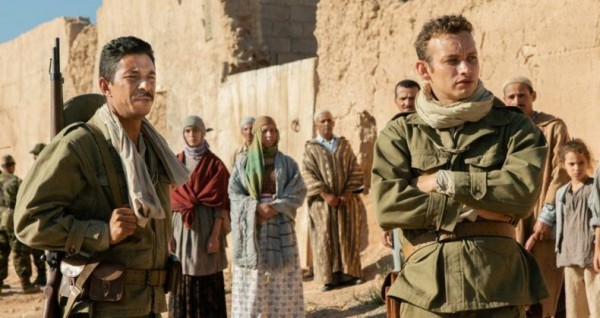
The abandoned ones
In 2016 Philippe Faucon won the César for Best French Film for Fatima. Not so flashy as Jacques Audiard's Palme d'Or winning Dheepan, it typically is a low-keyed exploration of the life of a Moroccan Arab immigrant woman struggling with a family in France. Faucon was born in Ouija, in northeastern Morocco. Though of French descent, he has often chosen in his seven feature films to present quiet studies of the North Africans. Les Harkis focuses on an abandoned, overlooked group, the Algerian Arabs who fought with the French in the long colonial war De Gaulle eventually ceded to the FLN, the National Liberation Front. Another term to know: Fallaghas. They are the somewhat disorganized fighters for Algerian liberation.
When the Algerian war ended March 19, 1962 and French military and civilians left Algeria, the Fallagas were the heros and the Harkis were the traitors, the enemy. Yet they had fought loyally in bilingual units led by French officers, wearing French uniforms and carrying French weapons, as we see here. Their unit commander, Lt. Pascal (Théo Cholbi, who has a small role in The Night of the 12th, shines here) isn't at all happy when he's given orders to leave them behind.
The French want the weapons back, and withdraw their officers. Lt. Pascal stays on, trying to help his young Algerian soldiers escape via Oran. French policy became to allow as few Harkis as possible to come to France, only those in "dire danger." In fact they were all in dire danger and ultimately tens of thousands of them were killed; the estimate is 35,000-80,000. Those allowed to come to France were badly treated, put in camps and kept there till the mid-seventies. America perpetrated similar injustices with the South Vietnamese in Vietnam, the Kurds in Syria, with their Afghan allies in Afghanistan: this is a film for us.
In The Harkis, in his typically low-keyed way, Faucon gives us glimpses of the last years up to the end of the Algerian war and what happened when it ended. He does not dramatize or take sizes. We see torture and murder, even a severed head early on on a straw bag. It's all so low-key you barely notice it. But you notice what a bad idea it is the French have that the Harkis should go back to their families and villages. They are not safe there. Even their families can't protect them.
We follow troups on maneuvers but in this low-keyed, low-budget film, we see little action. The aim is to show the integration of the officers and the men. Language is important: it's important to learn that the French officers don't speak or read Arabic, and tht many of the soldiers speak only a little French. All orders have to be translated into Arabic.
Faucon's 2005 Betrayal/La trahison also related to painful and dangerous divided loyalties during the Algerian conflict. Everyone knows Gino Pontecorvo's 1966 Battle of Algiers, which is a kind of revolutionary handbook-cum-action film. Faucon's Harkis is neither. He is interested not in politics or strategy but in atmosphere, experiences, what it felt like, what it meant to the individual, and the legacy it left behind. He works on a "little piece of ivory," whose meaning grows when you think about your experience of watching this film. Jean-Noël Orengo ofTransfuge, one of the admiring critics cited on AlloCiné, thought Les Harkis "may be Faucon's masterpiece." It's rare that a film about a violent conflict achieves such subtlety and nuance.
An lovely score by Amine Bouhafa soars especially in the closing credits, underlining the film's brave, contemplative mood.
Also with Pierre Lottin, Yannick Choirat, Omar Boulakirba, Mohamed Mouffok and Mehdi Mellouk.
Harkis/Les Harkis, 80 mins., debuted at Cannes Directors Fortnight May 19, 2022, also showing at Busan, Rio, Marrakech and other festivals. At French theatrical release it received an AlloCiné press rating of 3.9 (79%) Screened for this review as part of the Rendez-Vous with French Cinema (Mar. 2-12, 2023).
Showtimes:
Friday, March 3 at 2:00pm
Thursday, March 9 at 9:30pm
Last edited by Chris Knipp; 03-07-2023 at 12:33 AM.
-
BROTHER AND SISTER/FRÈRE ET SŒUR (Arnaud Desplechin 2022)
ARMAUD DESPLECHIN: BROTHER AND SISTER/FRÈRE ET SŒUR (2022)
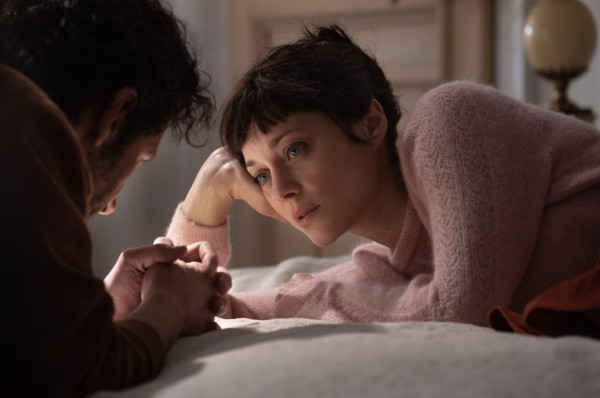
MARION COTILLARD IN FRÈRE ET SŒUR
In 'Brother and Sister' Desplechin returns to the theme of grandiosely squabbling families in a shriller, less convincing tone
Pillaging from some of his own personal greatest hits - a narrative and the Vuillard family names from 2008’s A Christmas Tale and a split story structure from 2004’s Kings and Queen , after an uneven but sometimes celebrated career path, Arnaud Desplechin seems with Brother and Sister, which stars Melvil Poupaud and Marion Cotillard as the titular siblings, to be desperately but not very coherently trying to recapture past glories. There are, as usual with Desplechin, moments of style and flair, but the incoherence and pretension are alienating, and the warmth and humor of earlier triumphs are lacking.
Though it's off-putting and silly, there's no lack of energy in the action. As Guy Lodge points out in a rather damning English language review for Variety, you can't fault this movie for starting slow. In the first ten minutes the two, we learn, violently but inexplicably estranged siblings curse each other out at the wake of the six-year-old son of poet brother Louis Vuillard (Poupaud) with actress sister Alice (Cotillard) calling him "an indecent monster"; there immediately follows a road accident sequence where a teenage driver is paralyzed and an old couple (parents of the siblings) is smashed up by a giant truck after they stop to help the girl, and wind up in the hospital, near death.
The "no bones" "dialed-to-11" melodrama thus telegraphed at the start is too shrill, and this comes out early in Melvil Poupaud. He's usually an understated actor (winningly so in Desplechin's Christmas Tale), and his grinning scream-fest at the get-go rings particularly false. Also one wonders why in his current state Poupaud's character has come to be living in such a remote place his shrink friend Zwy (Patrick Timsit) must rent a horse to go fetch him, other than that it looks cool. But beyond the false tone, what most bothers one overall is the failure to flesh out backstories, even to the extent of leaving the very premise of the piece, the implacable sibling resentment, forever blurred.
Time sequences in Julie Peyr’s screenplay jump around, sometimes confusingly. The trajectory is toward reconciliation, one that's assumed to be essential, and when it comes not remotely convincing. For two dozen years the two have been avoiding and hating each other. Why? Alice's "hate" for Louis seems to have popped out when, after a slow start, he suddenly wins a big literary prize. But giddiness in Cotillard's reading of lines at this moment makes one unclear it she's even serious. Maybe the issue was a revealing memoir he published for which, a throwaway line hints, she actually sued him. Anyway all this was in the past. Now Louis is a mess. He's unproductive, grieving the lost son and doing a lot of drugs and alcohol: his first act on arriving at the hospital for the parents is to score opium and other things. Alice is now famous as an actress (a big subway poster attests), touring with a production from Joyce's "The Dead," so what's wrong? She will later throw all this away, along with her husband and son. The latter we can understand since she paid no attention to them.
The siblings have a series of separate set pieces (Poupaud's often involve the grinning, the showing of teeth), inexplicable outbursts of enthusiasm. Alice's are prima donna moments. When she first appears she's in a classic pose backstage in front of her mirror, declaring that she can't perform today - and this is before she's learned her parents are at death's door. She has an illustrative meetup with a journalist and a more extended and cloying one with Lucia (Cosmina Stratan), a penniless young Romanian super-fan a more cautious celebrity would not have allowed to latch onto her. The journalist's interview takes place in an empty restaurant in the morning, where Alice prepars by ordering a tall gin on the rocks. When the journalist asks not about the un-famous gay bro, Fidèle (Benjamin Siksou) who lives in the provinces in Desplechin's native Roubaix, but about Louis, she gets up and walks out, gin barely sipped. Couldn't she just have said, "Next question"? But then there would have been no drama.
Brother and Sister/Frère et sœur, 108 mins., debuted in Competition at Cannes May 20,2022. Screened for this review as part of the Rendez-Vous with French Cinema (Mar. 2-12, 2023, NYC). AlloCiné press rating 4.1 (82%) but AlloCiné spectators score 2.4 (48%); Metacritic rating 60%. Screened for this review as part of the Rendez-Vous with French Cinema (Mar. 2-12, 2023, NYC). Showtimes:
Sunday, March 5 at 3:30pm (Q&A with Melvil Poupaud)
Tuesday, March 7 at 9:00pm
Last edited by Chris Knipp; 03-07-2023 at 06:30 PM.
-
SATURN BOWLING/BOWLING SATURNE (Patricia Mazuy 2022)
PATRICIA MAZUY: SATURN BOWLING/BOWLING SATURNE (2022)
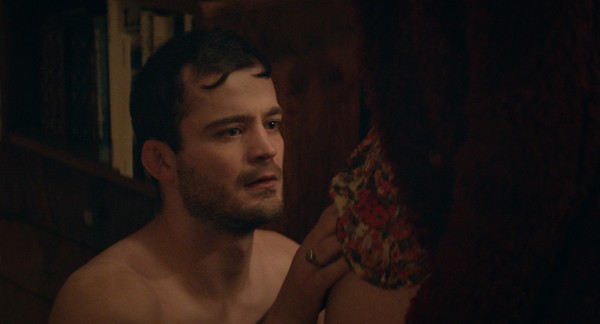
ACHILLE REGGIANI IN SATURN BOWLING
Toxic masculinity and bad blood in a film noir
The oddball Patricia Mazuy has done only a handful of features in 30 years. Her last, Paul Sanchez Is Back! was a bit of a goofy if entertaining misfire about provincial members of the French Gendarmerie. Now she has taken on a shocking male-on-female crime story, noir, procedural, and story of bad blood and toxic masculinity.
It's a slow start as the politically ambitious homicide detective Guillaume (Arieh Worthalter) inherits his father's bowling alley. Because it was dear to the man, he knows, he gives it to his illegitimate half brother Armand (Achille Reggiani). The two brothers don't like each other. A lot of the first half hour follows Armand. He remains a mystery but we see his darkness. He is virtually homeless. He hovers around young women offering them an umbrella in the heavy rain.
Then he takes the offer from Guillaume that he at first rejected. He gets management of the bowling alley, and must take their father's dark shepherd dog and his apartment, which is full of relics of wild game hunts. Hunting friends of their father haunt t the bowling alley, as if it were their club. Armand does not like them. Guillaume orders them to be humored. But he starts a flirtatious protective relationship with Xuan (Y-Lan Lucas) a young female animal rights activist whose group is at war with those hunters.
Armand casts off his hoodie and begins wearing his father's expensive snakeskin jacket. He is young, handsome, and now he is smiling and the young ladies pay attention to him. There is a seduction that ends in a disturbingly violent murder. Meanwhile Guillaume begins to head an investigation into serial murders of young women. Armand's conflict with the hunters - there are a dozen of them - and their "club" at the "bowling" heats up. Guillaume gets suspended because the serial killing investigation isn't winning and the hunters get him drunk.
As all this churns about, the film's second half is not sure whether it wants to be a procedural, Fincher style or just all hell breaking loose. It is a modern film noir with a distinctly French darkness, I suppose, with the sense of a war between men and women and on top of that a war between hunters and animal advocates. It is extremely tense and edgy - and very cinematic. It's final moments gather excitement at the cost of being rather chaotic. There's a pretty, perhaps a bit overbearing, use of red, of night light, of a sound track rife with menacing noises. The idea of post-colonial hunters as a menace to society and friend of the (passé) establishment feels new in this unhealthy context and feeds the boiling cauldron of menace and strife. This is a stronger film than her last from Mazuy and co-scripter Yves Thomas, and one that's at once classic in genre feel, contemporary, and sui generis.
Saturn Bowling/Bowling Saturne, 114 mins., premiered at Locarno Aug. 5, 2022 where it was a best film nominee and shpwed at a few other festivals. A Dark Star Pictures release, in French theaters Oct. 26, 2022; AlloCiné press rating 3.7 (74%), it was top rated by Cahiers du Cinéma and one of their editors' ten best films of the year. Achille Reggiani got several acting nominations. AlloCiné press rating 3.7 (74%). Screened for this review as part of the Mar. 2-12, 2022 Rendez-Vous with French Cinema (NYC).
Showtimes:
Sunday, March 5 at 6:30pm (Q&A with Patricia Mazuy)
Monday, March 6 at 3:45pm
Last edited by Chris Knipp; 03-09-2023 at 12:41 AM.
 Posting Permissions
Posting Permissions
- You may not post new threads
- You may not post replies
- You may not post attachments
- You may not edit your posts
-
Forum Rules




 Reply With Quote
Reply With Quote













Bookmarks